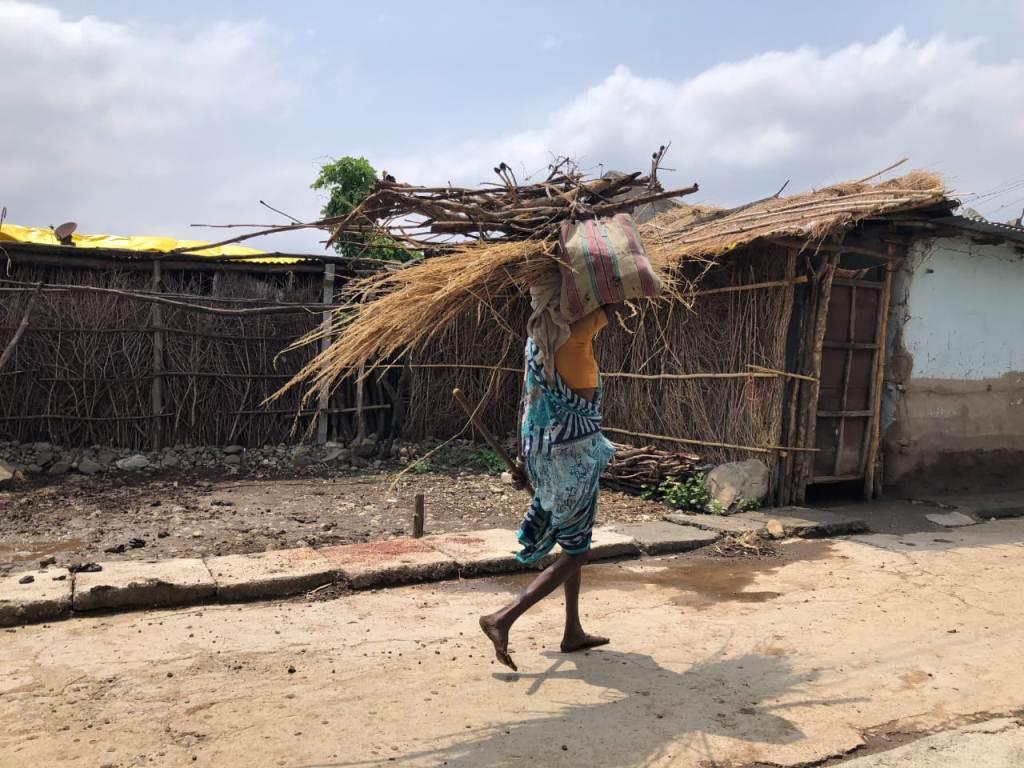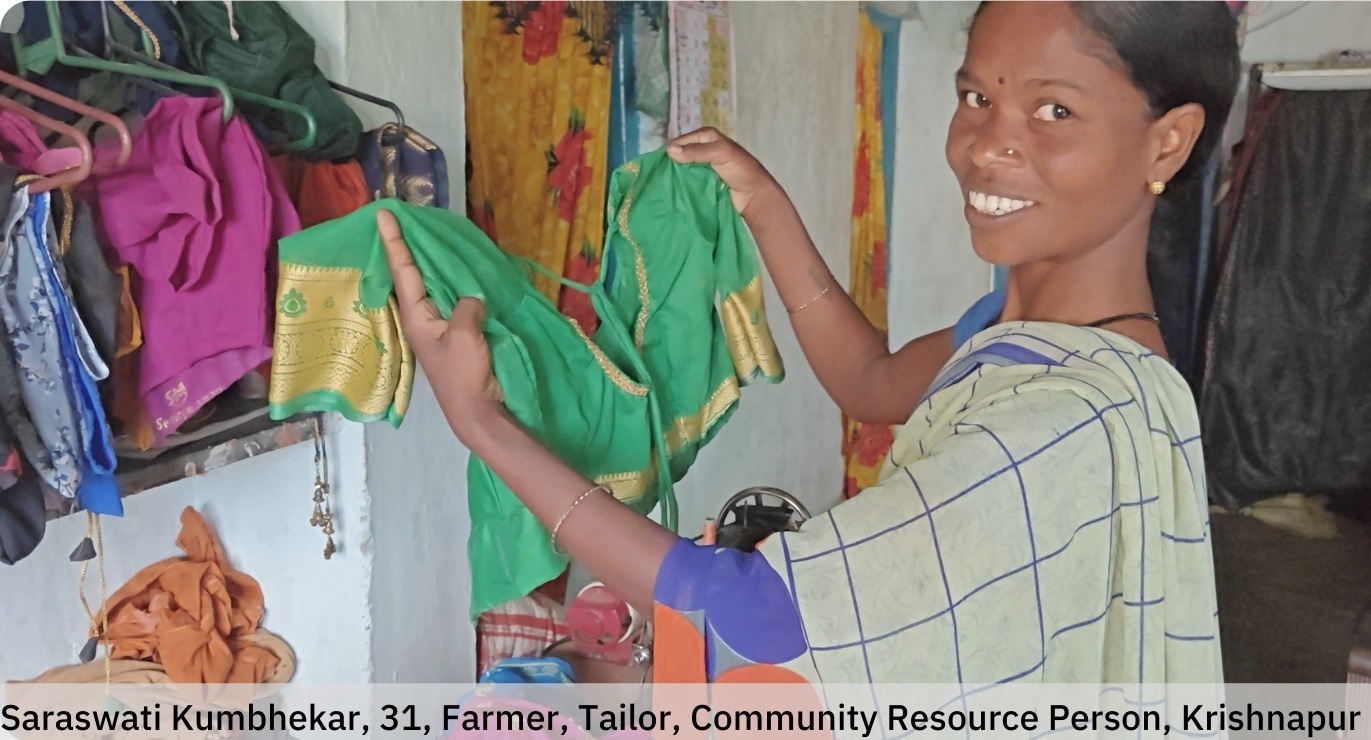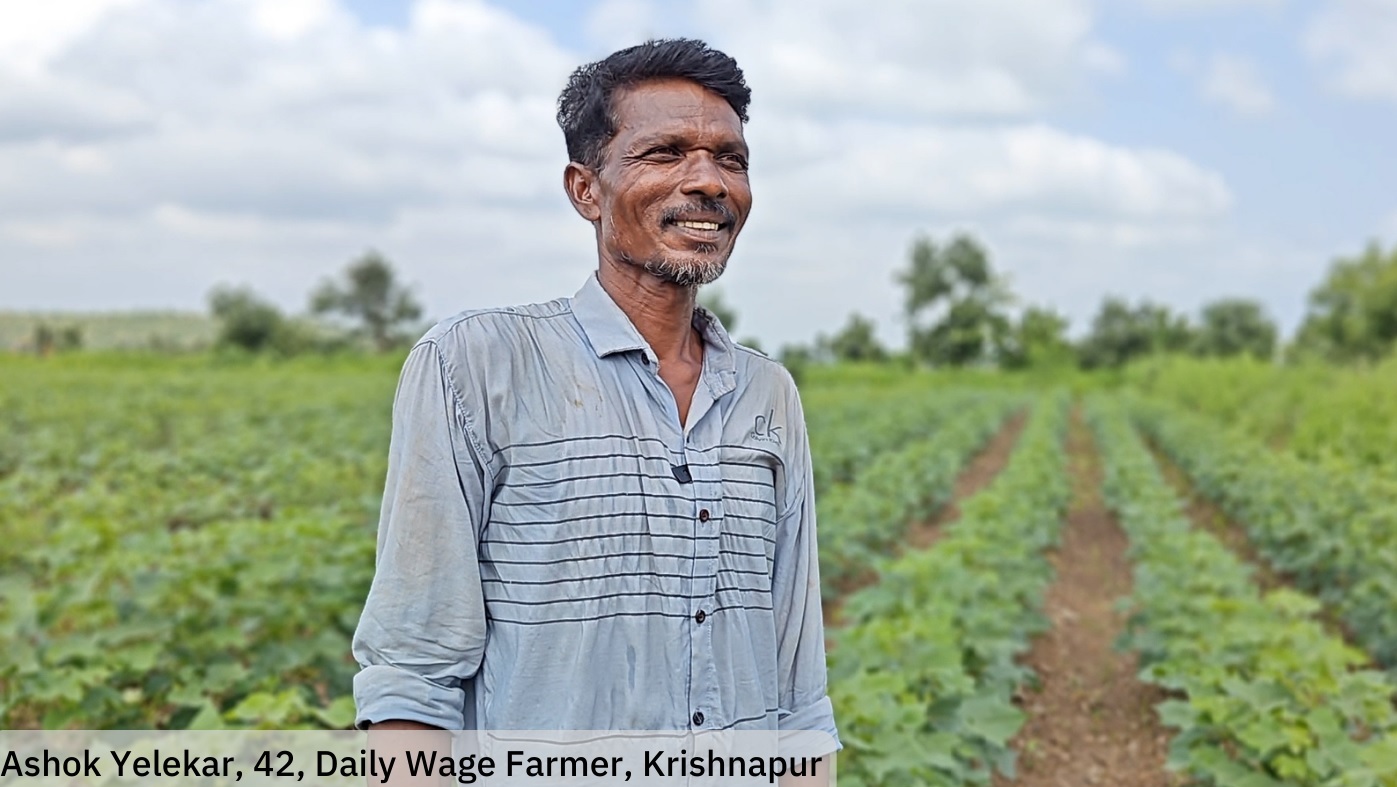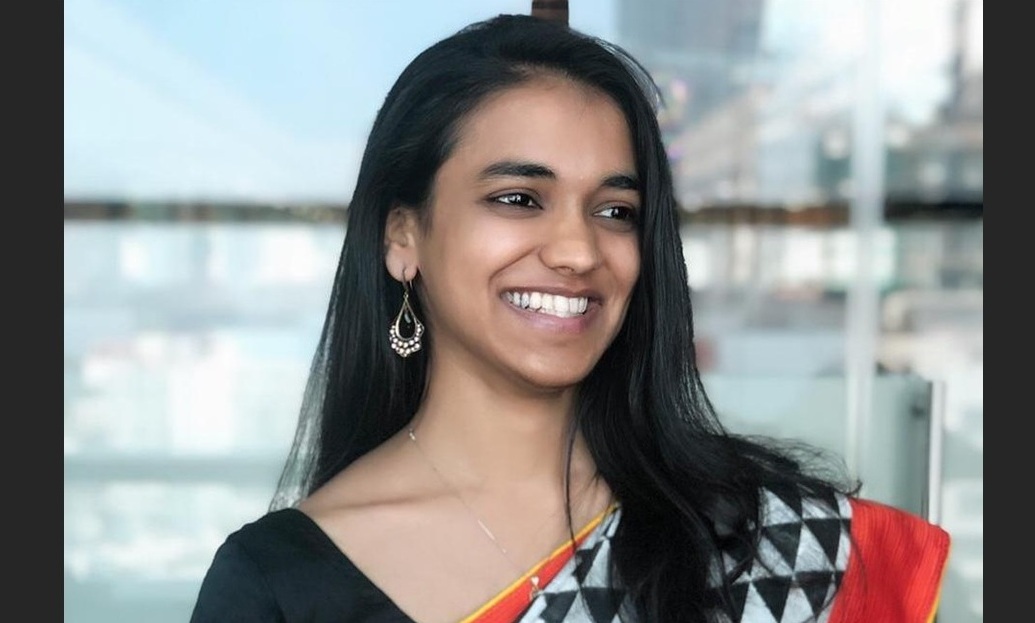As unconditional cash transfer (UCT) programs gain traction worldwide, India marks a significant milestone with the emergence of Project DEEP, a part of One Step Forward Foundation. Being the country's maiden direct cash transfer program, Project DEEP has launched the first-ever unconditional lump sum cash transfer program in Maharashtra, setting the tone for an innovative approach to poverty alleviation.
The program, initiated in May 2023, directly credited an unrestricted grant of INR 65,000 to the bank accounts of the oldest working women in 50 Krishnapur households in Maharashtra, benefitting the Kolam community, an officially recognized Scheduled Tribe. This transformative endeavour aimed to combat social disparities, fostering improved livelihoods and asset creation, which saw a notable surge in agricultural practices and housing development.
Drawing inspiration from a global movement backed by over 300 studies, highlighting the positive impact of cash transfers on poverty, Project DEEP seeks to redefine India's narrative on wealth redistribution and equitable opportunity. Further, the initiative has set its sights on the expansion of the flagship program to 1,600 households across Rajasthan and Maharashtra, focusing primarily on tribal communities.
In an exclusive interview with TheCSRUniverse, the visionary Co-founder of Project DEEP, Pankhuri Shah, shares invaluable insights into the program's groundbreaking strategy, addressing common misconceptions, and highlighting the transformative potential of unconditional cash transfers in the Indian context.
Read the full interview below to explore the unique vision and impact of Project DEEP in reshaping India's socio-economic landscape.
Q&A
 Q. What inspired Project DEEP to pioneer an unconditional lump sum cash transfer program in India, especially when such programs are a rarity in the country? What global examples inspired you?
Q. What inspired Project DEEP to pioneer an unconditional lump sum cash transfer program in India, especially when such programs are a rarity in the country? What global examples inspired you?
A. India has 33 lakh NGOs and yet none explore and understand the impact of giving directly and unconditionally.
When my co-founder, Muzamil and I wanted to contribute from our earnings, we realised that apart from government DBTs and one research experiment on UBI, there are no cash transfer programs in India, and therefore decided to take the plunge.
Inspired by 300+ studies globally and Give Directly’s success in Africa, we're pioneering a shift towards a more efficient, effective, and dignified approach to poverty alleviation in India. At the heart of Project DEEP are values of choice and dignity, embodied in unconditional cash transfers.
Q. What factors, do you think, have contributed to the relatively slow adoption of Unconditional Cash Transfers (UCTs) in the country?
A. Misconceptions about free money and its utilisation are the key deterrents to a cash transfer program.
- The general belief that there are no free lunches is constantly busted in our country where inheritance is untaxed. So many of us benefit from free money that was earned by the generations before us. Secondly, when loans, to the extent of INR 2.09 lakh crores in FY23 itself, are waived off for large corporates, they have essentially used free money for their growth. This aside, unconditional money to those living in poverty needs to be looked upon as their right, and not a freebie, given that they are left behind due to the growth narrative that leads to wealth and power concentration in some pockets of the country.
- Concerns about money being wasted on alcohol and gambling are a major reason why people resist direct cash transfers. There is also the idea that those designing or funding programs are better placed to decide how development must happen. However, research shows that substance use resulting from socio-economic stress actually reduces when there is financial stability provided through an unconditional grant. And people are the best judge of their own situations; the vast difference between our realities makes us ill placed to make choices for them.
Q. What key factors have driven the rapid success of Project DEEP's cash transfer program in boosting economic growth and employment in Krishnapur? In what key areas has this initiative delivered impact, such as debt relief, reduced domestic violence, improved mental health, education, and livelihood?
A.The program's design features proved crucial for its success, as validated by recent experience. With no usage restrictions, 50 families efficiently allocated the INR 65,000 they received to address their individual needs. They expanded farming activity by renting 47 additional acres, a 50% increase from last year, providing employment for over 35 individuals. Timely disbursement before the sowing season interrupted the usual debt cycle, offering mental relief and restoring dignity by reducing reliance on credit. Having cash in hand improved farming scheduling. Thirteen families fortified kucha houses and completed ongoing pucca constructions. Debts were settled, and savings earmarked for harvest, children's future, and emergencies. Medical expenses were covered, addressing long-pending health issues. This support brought immense joy and resilience, unlocking latent potential and aspirations, and opening doors to better opportunities. You can read more details of utlisation here and listen to the voices of the community in this video.
Uniform distribution without pre-conditions maintained social cohesion, benefiting the local economy. Previously constrained by the debt cycle, the village's economy now thrives with injected capital, energizing local MSMEs and overall economic activity.
 Q. Given the potential positive impact of unconditional cash transfers in different communities, what challenges and misconceptions has Project DEEP encountered and successfully addressed in the course of its initiatives?
Q. Given the potential positive impact of unconditional cash transfers in different communities, what challenges and misconceptions has Project DEEP encountered and successfully addressed in the course of its initiatives?
A.The utilisation survey showed the power that unconditional money has to relieve stress and unleash people's latent aspirations. It demonstrated that people have unique needs and know how to address them when they have the required resources. There are some brilliant cases showcasing people’s keen thinking after receiving the money. Saraswati decided to expand her farming activities, and use the harvest money to grow her tailoring business and get treatment for her son.
In another case, a ninth standard boy, Aniket, recommended buying a speaker for commercial use. A third of the cost has already been recovered in just three months, by renting it out for occasions. Profits from these are likely to enable his re-enrollment in school.
In my opinion, the myths around the effective use of money, induced laziness, substance use, and need for training have been dispelled.
Q. What methods and criteria does Project DEEP employ to assess the impact of its unconditional cash transfer program on the beneficiaries and the local economy? How cost effective and administratively viable is the whole process?
A. Cash transfers are simply designed, effective programs, whose impact can be measured easily.
Before initiating the program, a comprehensive baseline survey is administered, covering family composition, education, health, assets, documentation, finances, and mental health. This survey has been meticulously developed by consolidating established frameworks, and undergoing iterative refinement in collaboration with experts, including PhD scholars from IIT-B and IIM-A.
A basic utilization survey is conducted three months post disbursement to understand where people have used the money and how they arrived at the decision. It also delves into transactional procedures to identify any challenges.
A year after the transfer, an endline survey is conducted to gauge the progress of each household in comparison to the baseline. Impact assessments are conducted annually to measure the program's long-term effects.
This process involves 2-3 team members and local volunteers on the ground for 10-12 weeks. The focus is on maintaining a lean team, streamlined design, and efficient timelines to keep organizational costs below 10%. Cash transfers are administratively straightforward and operationally effective, making them highly replicable and scalable.
 Q. Could you share specific stories or anecdotes of how individuals or families in Krishnapur have been transformed by Project DEEP's unconditional cash transfers
Q. Could you share specific stories or anecdotes of how individuals or families in Krishnapur have been transformed by Project DEEP's unconditional cash transfers
A. Below are some stories that exemplify the creative uses that the money has been put to. It has been a heartening experience to sit with each family and discuss how their life has been transformed. The smiles on their faces and confident body language speak a lot more than their words.
- Ashok took farming land on rent for the first time. This has greatly boosted his self-confidence and he aspires to double his investment and improve his lifestyle from thereon.
- Prabhabai created a separate kitchen shed to ensure that the smoke from the chulha would not enter the house. She also bought a bike to ease commute for her son, who works in a nearby village. He saves rent and food money, but more importantly gets good nights’ sleep in his own home.
- Sunanda paid the medical expenses of her daughter-in-law’s delivery of twins, which would have otherwise required her to sell their cow.
- Ramabai bought a motor pump and pipes to irrigate her farmland, ensuring water availability and the ability to grow crops and vegetables all year round. She feels proud and relieved that she has created an asset that will benefit her future generations as well.
Q. What role does technology play in facilitating the distribution of cash transfers to beneficiaries in Krishnapur?
A. At the moment, the focus is on contextualising the program design to different contexts and generating evidence for the same. Technology will play a huge role in the large-scale implementation and we have multiple ideas that need to be tested out.
- Technology for Common Resource Persons that enables them to facilitate remote bank account opening for their community to mitigate fraud risk
- Satellite imaging to identify remote areas and below poverty regions
- A platform for retail funders to transfer money directly to the target audience, especially in crisis situations or for disaster relief
- AI simulators to measure growth in the local GDP and inflation levels due to monetary injections
Q. Could you shed light on the key partners and sources of funding that have been instrumental in supporting Project DEEP's initiatives for UCTs?
A. In the past year, we have been able to cement strong partnerships with different organisations.
- Our on ground implementation is in partnership with Yung Foundation in Maharashtra and Shram Sarathi in Rajasthan.
- DJED Foundation will play a pivotal role in co-devising and implementing the ecology-related plus programs in the communities where we are working. Nirabhra Foundation is exploring how cash transfers can be leveraged to boost uptake for solutions that address challenges in nutrition & health.
- We are also being incubated by The / Nudge Center for Social Impact.
- The Krishnapur project was made possible by the contributions of 50+ individuals from our personal networks. Ongoing support for our forthcoming projects has been committed by the Indian journalist and economist Swaminathan Aiyer and Neeraj Kaushal and two renowned names from the diamond market, Kanaiyalal Bapalal Shah and Ankit Gems.
We continue to leverage our existing donors to connect us within their network by sharing their experience of the program, and building our team to seek out and bring in more like-minded donors as we grow.
Q. Given that unconditional cash transfers (UCTs) are often of short-term nature, what challenges might Project DEEP face in terms of sustaining their impact, especially when compared to the long-term effects typically associated with conditional cash transfers (CCTs)?
A.An unconditional transfer works as seed capital for people, unleashing their latent aspirations and potential. It helps them fulfill their unique needs and access relevant opportunities to improve their livelihood.
In contrast, while CCTs show great movement on the desired indicators that they are meant for, it generally does not create a holistic impact within communities. It assumes that those living in poverty are not capable of wise choices themselves. There is also the risk that the program may not reach the most needy if they are unable to fulfill the predetermined conditions.
Therefore, systemic poverty eradication which creates impact for the community as a whole and includes the recipient in the problem definition and solution process, thereby enhancing self confidence, dignity and resilience is more effective through unconditional cash transfers.
Q. In a country where extensive public distribution systems and public works programs are prevalent, how does Project DEEP's UCT initiative align with or diverge from the government's welfare efforts, and what role does the government play in supporting Project DEEP's mission?
A. P. Chidambaram (as Finance Minister in 2007) mentioned that the Planning Commission estimated that one rupee of food cost Rs.3.65 to administer (in relation to the Public Distribution Scheme).
While existing government schemes have been effective in specific domains of food security (through PDS) and housing (PMGAY) and jobs (MNREGA) for certain demographics, the implementation process is expensive and last mile delivery is fraught with challenges of administration, quality and access. And poverty and inequality continue to persist.
There has been a trend towards direct benefit transfers in India, through State and Central governments, in the form of PM Kisan, Rythu Bandhu, Kalia, Gruha Lakshmi, pension for widows, those with disabilities and senior citizens. We want to leverage this, and by plugging the evidence gap around effective design, contextualisation and impact, advocate for large scale implementation for poverty eradication.
Q. How does Project DEEP envision the sustainability of its UCT model in comparison to traditional welfare schemes, and what measures and public awareness strategies are needed for effective implementation and accountability of such programs?
A.Cash transfer programs are not the silver bullet that can replace all welfare schemes. However, they can be the more effective alternative for the plethora of schemes that have low uptake and low impact. This would bring down the cost, increase the reach and transform the lives of many.
It can also be added as an element to existing schemes and programs. For example, sustainable agriculture is receiving a huge amount of interest given climate change. However, farmers find it difficult to switch to organic alternatives given the risk that is inherent in trying something new, and the cost required for the same. Introducing cash in such a program creates a security net, almost acting as an insurance or incentive for change. This can be applied to various other existing programs.
All in all, the idea through cash is to recognize that people have unique needs, and their own way and reason for prioritizing which we, from a very different context, must refrain from questioning or dictating.
Q. What are Project DEEP's strategies for expanding the reach of its unconditional cash transfer program to 1,600 households in Rajasthan and Maharashtra? Additionally, considering India's vast socio-economic diversity, how do you envision the adaptability and effectiveness of the UCT model in various regions?
To reach 1,600 households, we'll partner with local organizations for community insight and implementation support. In Rajasthan, we'll focus on multiple hamlets in close proximity to amplify the impact of financial support. Maharashtra will serve as our base for diverse implementation covering urban poor, remote tribal communities, and vulnerable sections. This approach builds a robust base across the socio-economic landscape.
We've established a framework, archetyping villages into four development stages, based on parameters like infrastructure, market access, migration, livelihoods, financial stability, and social vulnerability. We believe that the utilisation of unconditional money across the stages will be aligned to Maslow's hierarchy, where the most deprived will address immediate needs like food and shelter, improving cognitive capacities leading to improved decision making and financial stability over the long term; whereas those with the basic necessities in place will be able to use the money to establish sustainable livelihoods resulting in better consumption, nutrition and education over time. In all cases, cash will work as the bedrock for breaking the cycle of poverty.





 Q. What inspired Project DEEP to pioneer an unconditional lump sum cash transfer program in India, especially when such programs are a rarity in the country? What global examples inspired you?
Q. What inspired Project DEEP to pioneer an unconditional lump sum cash transfer program in India, especially when such programs are a rarity in the country? What global examples inspired you? Q. Given the potential positive impact of unconditional cash transfers in different communities, what challenges and misconceptions has Project DEEP encountered and successfully addressed in the course of its initiatives?
Q. Given the potential positive impact of unconditional cash transfers in different communities, what challenges and misconceptions has Project DEEP encountered and successfully addressed in the course of its initiatives? Q. Could you share specific stories or anecdotes of how individuals or families in Krishnapur have been transformed by Project DEEP's unconditional cash transfers
Q. Could you share specific stories or anecdotes of how individuals or families in Krishnapur have been transformed by Project DEEP's unconditional cash transfers












.jpg)



